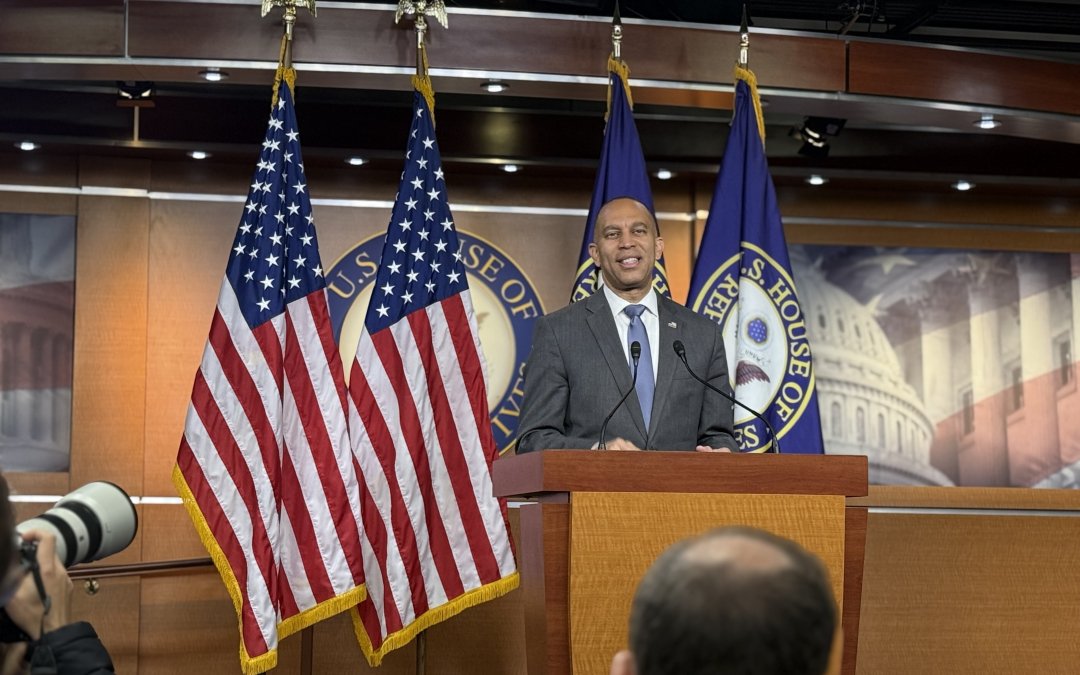WASHINGTON — When House Minority Leader Hakeem Jeffries, D-N.Y., took the podium for his first weekly press conference since the election, he became one of the highest ranking Democrats to field questions about his party’s crushing loss. Addressing a crowded room of reporters, Jeffries said that while he hopes to find bipartisan solutions wherever possible with Trump at the helm, he would continue to push back “whenever necessary against far-right extremism.”
Jeffries appearance comes just days after Republicans officially retained control of the House.
In an election cycle where President-elect Donald Trump placed the country’s southern border at the forefront, an electoral win in a district that borders Mexico gave his party the congressional majority it hoped for. Rep. Juan Ciscomani, R-Ariz., narrowly defeated his opponent Kirsten Engel, clearing the way for a legislative agenda shaped entirely on Trump’s uninhibited priorities.
Now, Democrats will begin bracing for Republican trifecta that spans the House, Senate and White House.
Jeffries framed the moment as an opportunity to find common ground with his more conservative colleagues, but made clear that he doesn’t intend to shy away in moments when he believes Democratic principles are at stake.
“We will defend the Affordable Care Act. We will defend the progress we’ve made on the climate crisis. We will defend voting rights,” Jeffries said, outlining what he deemed to be non-negotiable priorities for House Democrats. “And we will certainly defend a woman’s freedom to make her own reproductive healthcare decisions at all times.”
Jeffries said that it was important for Democrats to examine what allowed Trump to garner electoral gains in nearly every demographic voting bloc on a local level and offered his home state of New York as “an interesting case study.” Even though Trump gained ground in historically Democratic areas like Queen and the South Bronx, Democrats still managed to flip what had previously been four Republican seats in New York.
Addressing a broad array of topics, Jeffries touched on everything from artificial intelligence and the war in Ukraine to his experience working alongside former Rep. Matt Gaetz, R-Fla., on the House Judiciary Committee. Inquiries regarding Gaetz came as the House Ethics Committee has a pending investigation into allegations of his sexual misconduct. Gaetz has been under heightened scrutiny following his recent appointment to be considered for Attorney General.
When first asked about Gaetz, Jeffries deflected the question toward other senior position appointments in the Trump administration.
“The former president promised on the campaign trail that America would have the best economy, the best border security, and the best administration possible,” Jeffries said. “And the question that we all have to ask when we’re confronted with nominations like Robert F. Kennedy Jr. is, are these the best individuals available?”.
When asked again, Jeffries appeared more frustrated. He said that he’s not going to answer questions about potential White House officials for the next two years, citing former Congresswoman Tulsi Gabbard and Gaetz as examples.
“That’s all a distraction,” Jeffries said, calling on Senate Republicans to act independently and serve as a check and balance on “a particularly out-of-control, when it emerges, administration.”


